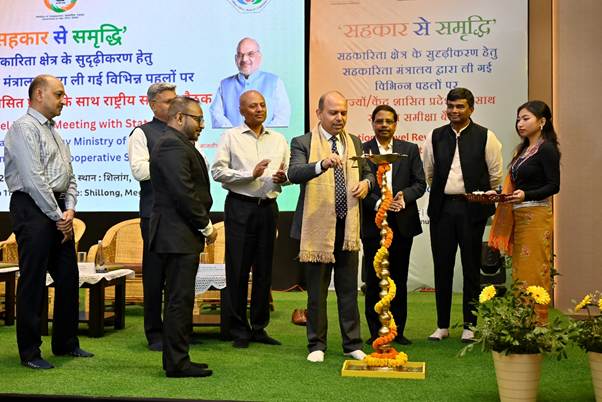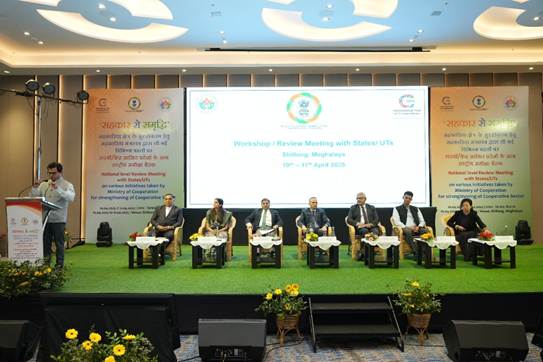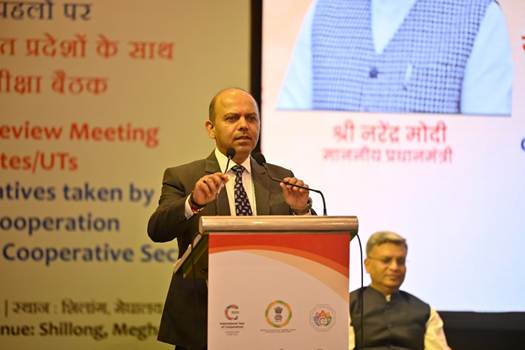Ministry of Cooperation
Secretary, Ministry of Cooperation, Dr. Ashish Kumar Bhutani, addresses the inaugural session of the two-day National Level Review Meeting in Shillong, Meghalaya
Initiatives and formulation of strategies to further strengthen and modernise the Cooperative Sector across the country discussed during the Review Meeting
Under the leadership of Prime Minister Shri Narendra Modi and guidance of Union Minister of Cooperation Shri Amit Shah Ministry is committed to promoting cooperative-led economic growth
Dairy sector has shining examples of how the sector can empower women and improve child nutrition
Role of national-level cooperative institutions such as NCEL, NCOL, BBSSL, NCCF, and NAFED pivotal in enhancing the cooperative ecosystem and driving innovation and inclusivity
प्रविष्टि तिथि:
11 APR 2025 6:24PM by PIB Delhi
The Secretary, Ministry of Cooperation, Dr. Ashish Kumar Bhutani, addressed the inaugural session of the two-day National Level Review Meeting in Shillong, Meghalaya. The Review meeting, held on 10-11 April 2025, discussed initiatives and formulation of strategies to further strengthen and modernise the Cooperative Sector across the country.

Speaking at the inaugural session, Dr. Ashish Kumar Bhutani said that under the leadership of Prime Minister Shri Narendra Modi and the guidance of Union Home Minister and Minister of Cooperation Shri Amit Shah the Ministry is committed to promoting cooperative-led economic growth with robust inter-state cooperation to realize the vision of “Sahakar Se Samriddhi.” He stressed on collating the PAN numbers of all cooperative societies of the country to enable more accurate representation of the cooperative sector in the national GDP. Dr. Bhutani reaffirmed the Government’s unwavering commitment to strengthening and advancing the cooperative ecosystem in the country.
The Secretary, Ministry of Cooperation said that White Revolution 2.0 is one of the flagship initiatives, aimed at rural upliftment through the dairy sector. He said that the dairy sector has shining examples of how dairy can empower women and improve child nutrition. He said that we are partnering with institutions like Amul and NDDB to support states Assam, Jharkhand, Uttar Pradesh and other states in expanding dairy infrastructure. The economic potential of animal husbandry now exceeds that of traditional crop cultivation.

Dr. Ashish Kumar Bhutani said that passing of the bill to establish India’s first Tribhuvan Sahkari University is a historic move. This university will standardise cooperative education across states and uplift over 250 existing cooperative institutions.

Secretary, Ministry of Cooperation, and Chief Secretary, Govt. of Meghalaya, along with senior officials, took part in a tree plantation drive under the initiative “Ek Ped Maa Ke Naam” initiative in International Year of Cooperatives.
The meeting brought together key stakeholders including representatives from States and Union Territories, officials from cooperative federations, financial institutions, and policymakers, fostering a collaborative platform for knowledge exchange and strategic alignment.
The States Review Session spotlighted the pivotal role of national-level cooperative institutions such as NCEL, NCOL, BBSSL, NCCF, and NAFED in enhancing the cooperative ecosystem and driving innovation and inclusivity.
Director of IRMA, Anand (Gujarat), outlined the vision of Tribhuvan Sahkari University, the strategic objectives, and proposed institutional structure. The session reflected the Ministry’s long-term commitment to developing world-class cooperative education and research infrastructure.
A dedicated workshop on the International Year of Cooperatives 2025, focusing on strategic priorities such as benchmarking cooperative societies, impact assessment, and the formulation of a Business Reform Action Plan for the upcoming fiscal year. Delegations from Maharashtra, Gujarat, and Uttarakhand shared best practices and innovations in cooperative development.
The focus areas of the two-day sessions were on expansion of banking services for cooperative societies and ensure doorstep banking services via micro-ATMs along with provision of zero-interest loans through RuPay Kisan Credit Cards to members of Primary Agriculture Credit Societies (PACS), Dairy Cooperative Societies and other Cooperative institutions, and strengthening of Rural Cooperative Banking. Expansion of time-bound establishment of Multi-Purpose Agriculture Cooperative Societies (MPACS), Dairy and fishery cooperatives, Grain Storage Plan, digital transformation of PACS and Agriculture and Rural Development Banks (ARDBs) with an aim to improve transparency, operational efficiency, and service accessibility was also discussed. An analytical discussion was also held on the impact of NCDC’s schemes and the realignment of its strategic direction with broader national development priorities.
******
RK/VV/PR/PS
(रिलीज़ आईडी: 2121020)
आगंतुक पटल : 1397